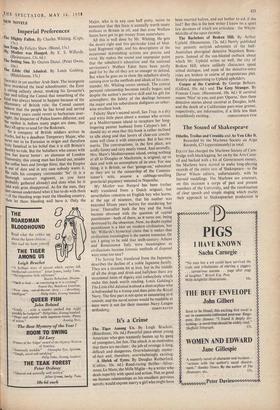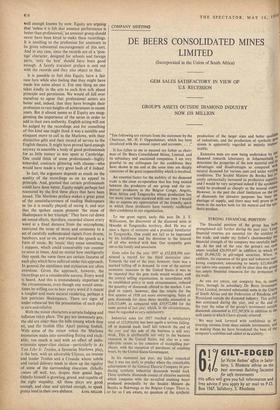The Sound of Shakespeare
Othello, Troilus and Cressida and As You Like It. Recorded by the Marlowe Society on Argo Records, £23 (approximately) in total.
EQUITY has charged the Marlowe Society of Cam- bridge with blacklegging. Set on by the Arts Coun- cil and backed with a bit of Government money, the Marlowe have started to make long-playing records of the entire text of Shakespeare—in the Dover Wilson edition, unfortunately, with its learned meddlings. The Marlowe are amateurs, on this occasion a corps of past and present members of the University, and the combination of clear speech and simple staging which marks their approach to Shakespearian production is
well enough known by now. Equity are arguing that 'unless it is felt that amateur performance is better than professional,' an amateur group should never have been hired to make these recordings. It is insulting to the profession for amateurs to be given substantial encouragement of this sort.
And in any case, since the records are of a 'pres- tige' character, designed for schools and foreign
parts, `only the best' should have been good enough. A faintly truculent preface is sent out with the records and they also object to that.
It is possible to feel that Equity have a fair case here while also feeling that they might have
made less noise about it. For one thing no one takes kindly in the arts to such firm talk about principle and permission. We would all fall over ourselves to agree that professional actors are better and, indeed, that they have brought their profession to rare heights of achievement in recent years. But it almost seems as if Equity are exag- gerating the importance of the series in order to add to their own authority. English acting will not be judged by the recordings and for something of this kind one might think it was a suitable and eloquent move to call in the Marlowe, with their distinctive gifts and their record of service to the English theatre. It might have proved hard enough anyway to assemble a body of good professionals for as little money as was spent at Cambridge. One could think of some professionals—highly rewarded, contracts glittering with clauses—who would have made a very great hash of it indeed.
In fact, the argument depends as much on the quality of the recordings as on an appeal to principle. And, granted that certain professionals could have done better, Equity might perhaps feel reassured by the first three plays that have been issued. The Marlowe preface makes a great point of the unsatisfactoriness of reading Shakespeare or (as it is usually played) of seeing it, and says that the spoken canon presents 'the muse of Shakespeare in her triumph.' They have cut down on sound effects, therefore, recorded almost every word at a fixed distance from the microphone, restricted the noise of stress and ceremony to a set of carefully authenticated signals from drums, hautboys, and so oh, and treated the speech as a form of music. By 'music' they mean something, I suppose, which could conceivably run counter to sense at times. And no matter how intelligently they speak the verse there are certain features of each play which have suffered under this approach. In general the stateliness and stylisation are often overdone. Given the approach, however, the recordings are a considerable success. Every word is heard. And this is tremendously important in the circumstances, even though one would some- times be willing not to hear every word if it meant a tougher and more natural rendering, perhaps a less patrician Shakespeare. There are signs of under-rehearsal but the presentation of each play is sure and reliable.
With the minor characters a certain fudging and inflation takes place. The gay are immensely gay, the old are older- than the hills among which they sit, and the foolish (like Ajax) passing foolish. With some of the minor voices the Marlowe intonation stales into something fluting and excit- able; too much is said with an effect of indis- criminate upper-class elation—particularly in As You Like It. Troilus, a favourite Marlowe play, is the best, with an admirable Ulysses, an intense and tender Troilus and a Cressida whose subtle and varied delivery 'tends to show up the rigidity of some of the surrounding elocution. Othello comes off well, too, despite their genial Iago. Othello himself is growling, grand, and capable of the right stupidity. All three plays are good enough, and clear and spirited enough, to speak
pretty loud in their own defence. KARL MILLER



































 Previous page
Previous page